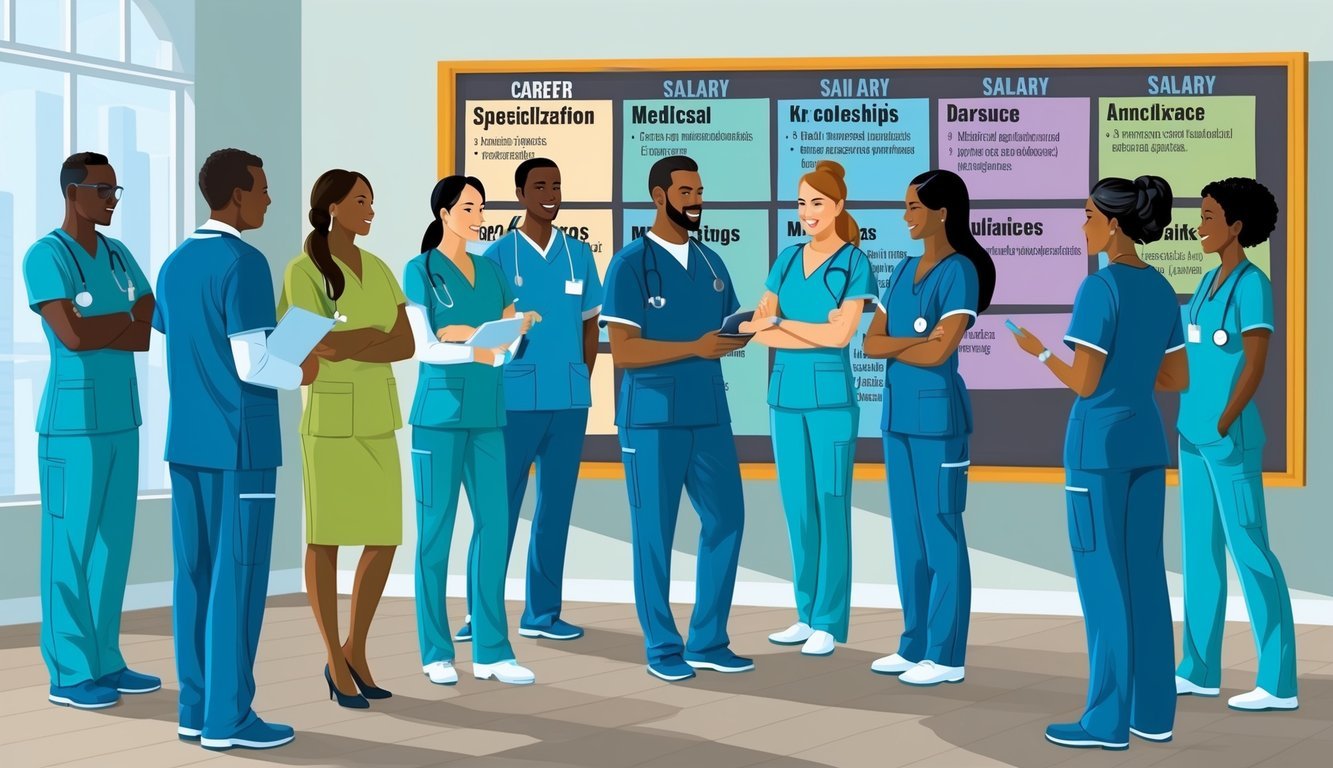As you explore your options in the nursing field, the decision to pursue a Master of Science in Nursing (MSN) can significantly impact your career trajectory.
Graduates from MSN programs often enjoy enhanced opportunities in advanced practice roles such as Nurse Practitioners, Nurse Midwives, and Nurse Anesthetists. On average, MSN-prepared nurses can earn around $125,900 annually, compared to $81,220 for those with only a Bachelor of Science in Nursing (BSN).
The demand for skilled nursing professionals continues to rise, making an MSN not just a degree but a valuable asset in today’s healthcare landscape.
By specializing through advanced practice registered nursing, you can position yourself to access higher wages and more diverse job opportunities within various healthcare settings.
Understanding the salary potential tied to MSN education can help you make informed decisions about your career path.
With competitive salaries and the chance for growth in specialized roles, your investment in an MSN program could lead to both personal fulfillment and financial stability in your nursing career.
For detailed insights, check this resource.
The Role of Education in Nursing
Education plays a crucial role in shaping the competencies and skills of nursing professionals.
Transitioning from a Bachelor of Science in Nursing (BSN) to a Master of Science in Nursing (MSN) enhances career opportunities.
It also equips you with advanced knowledge and practical skills essential for diverse roles in nursing.
Advancing from BSN to MSN
Pursuing an MSN degree allows you to specialize further in your field.
The transition from BSN to MSN usually involves coursework that deepens your understanding of clinical practices and leadership.
Core areas of focus often include advanced pharmacology, pathophysiology, and health assessment.
Additionally, an MSN degree can prepare you for roles in nursing education, administration, or clinical practices.
Compared to BSN-prepared nurses, you may have opportunities for higher salaries and positions such as nurse practitioner or clinical nurse specialist.
This advancement can also allow you to engage in roles that influence healthcare policy and education.
MSN Curriculum Development
The curriculum for an MSN in Education is designed to provide both theoretical and practical knowledge.
It typically includes a blend of core coursework and specialization classes.
Important components may consist of teaching strategies, curriculum development, and program evaluation methods.
For instance, nursing education programs integrate essential instructional design principles that help you create effective learning experiences.
You will learn to assess students’ needs, develop assessments, and refine instructional materials based on feedback.
Furthermore, courses often emphasize evaluating educational outcomes, ensuring that you can effectively measure the impact of educational interventions.
Clinical and Teaching Components
Clinical hours are an essential aspect of MSN programs, particularly for those specializing in nursing education.
These hours provide you with hands-on experience in various healthcare settings, reinforcing theoretical knowledge with practical application.
In addition, teaching components enable you to apply advanced pedagogical strategies in real-world environments.
This dual focus helps cultivate essential competencies, such as communication and critical thinking, that are vital in both clinical practice and educational settings.
Emphasizing these skills prepares you to educate future nurses effectively.
Career Opportunities and Specializations for MSN Graduates

Graduates with a Master of Science in Nursing (MSN) have access to diverse roles in healthcare.
These roles include advanced clinical practice, leadership, and educational positions that address the increasing complexity of patient care.
Nurse Educator and Administrator Roles
As a Nurse Educator, you will play a crucial role in shaping the next generation of nurses.
This position typically involves teaching in academic settings, mentoring students, and developing curricula.
Your expertise helps bridge the gap between theoretical knowledge and practical skills, ensuring that new nurses are well-prepared for clinical challenges.
Nurse Administrators manage nursing departments or healthcare facilities, overseeing staff, budgets, and policies.
This role requires strong leadership skills and strategic planning.
You will need to coordinate with other departments to enhance patient care quality and improve operational efficiency.
Clinical Practice Specializations
In clinical practice, you can choose from various specializations.
Options include becoming a Nurse Practitioner (NP), Clinical Nurse Specialist (CNS), or Nurse Midwife.
Each role requires specific training and certifications.
Nurse Practitioners provide primary and specialized care, often focusing on areas like family, pediatrics, or gerontology.
As an NP, you can diagnose and treat medical conditions independently.
Clinical Nurse Specialists possess expertise in specific areas, such as oncology or critical care.
They serve as consultants within healthcare teams, improving patient outcomes through evidence-based practices.
Nurse Midwives offer care to women during pregnancy, childbirth, and postpartum, emphasizing holistic approaches.
Leadership and Research Positions
In leadership positions, you can influence healthcare policy and practice.
Consider roles like Clinical Nurse Leader or Research Nurse.
As a Clinical Nurse Leader, you are responsible for patient care coordination and improving outcomes.
This role combines clinical expertise with leadership skills, allowing you to advocate for best practices within teams.
Research Nurses engage in clinical research, contributing to advancements in nursing science.
This role involves designing studies, collecting data, and collaborating with other health professionals to enhance patient care and treatment methods.
Each of these specializations offers unique opportunities to make a significant impact in healthcare settings, shaping the future of nursing practice.
For detailed salary information, you can refer to NursingProcess.org and Nurse.org.
Earning Potential for MSN Graduates
The earning potential for MSN graduates varies significantly based on specialization, geographical location, and years of experience.
Understanding these factors can help you navigate your career path effectively.
Salary Comparisons by Specialization
Different nursing specializations yield varying salaries.
For example, Nurse Practitioners typically earn between $115,000 and $130,000 annually.
Clinical Nurse Specialists often see salaries ranging from $80,000 to $100,000, dependent on the clinical setting. Nurse Midwives tend to have some of the highest earning potentials, with an average salary around $125,000.
Here’s a brief salary comparison:
| Specialization | Average Salary |
|---|---|
| Nurse Practitioner | $115,000 – $130,000 |
| Clinical Nurse Specialist | $80,000 – $100,000 |
| Nurse Midwife | $125,000 |
These figures demonstrate that your chosen specialization significantly influences your potential earnings.
Geographical Influences on Earnings
Your location plays a critical role in determining your salary.
States like California, Massachusetts, and New York are known for offering higher salaries due to their cost of living and demand for healthcare professionals.
For instance:
| State | Average Salary |
|---|---|
| California | $135,000 |
| Massachusetts | $125,000 |
| New York | $120,000 |
These states also provide diverse opportunities in various healthcare settings, contributing to their competitive salaries.
Impact of Experience and Education
Years of experience can significantly affect your earnings.
As you accumulate experience, your salary generally increases.
Entry-level MSN graduates can expect to start at about $70,000, while those with 5-10 years of experience may earn between $90,000 and $110,000.
Educational credentials, such as additional certifications or specialized training, can also boost your earning potential.
Advanced certifications can result in salaries exceeding $140,000 for experienced professionals.
Understanding how these factors interplay will help you make informed decisions about your MSN education and career path.
Factors Influencing MSN Education Salary
Several key factors can significantly affect your MSN education salary.
Understanding these elements can help you make informed decisions about your career path and potential earnings.
Employer Type and Sector
The type of employer plays a crucial role in determining your salary as an MSN holder.
Salaries can vary widely between sectors such as hospitals, outpatient care centers, and educational institutions.
Typically, advanced practice roles in hospitals tend to offer higher salaries compared to other settings.
Here’s a brief overview of salary expectations across different sectors:
| Employer Type | Average Salary Range |
|---|---|
| Hospitals | $120,000 – $150,000 |
| Outpatient Care Centers | $110,000 – $140,000 |
| Educational Institutions | $90,000 – $120,000 |
| Government Agencies | $95,000 – $125,000 |
Your role within these organizations influences your pay as well.
Positions like Certified Registered Nurse Anesthetists (CRNAs) and Nurse Executives command some of the highest salaries in the field, with CRNAs earning a median salary of about $212,650.
Negotiating and Benefits
Negotiating your salary is vital for maximizing earnings.
Many employers may offer salary negotiation as part of the hiring process.
Ensure you research average salaries in your area to arm yourself with facts during negotiation.
In addition to base salary, consider the complete benefits package, which may include:
- Tuition Reimbursement: Many employers offer assistance for further education.
- Health Insurance: Comprehensive coverage is essential for your overall compensation package.
- Retirement Plans: Contributions to retirement savings can significantly influence long-term financial health.
A strong negotiation can often lead to better benefits, which may equate to a higher overall salary in the long term.
Education and Certification
Your educational background and certifications can greatly impact your salary potential.
An MSN degree generally results in higher earnings compared to a BSN.
Specialty certifications can also lead to increased pay.
Certifications to consider include:
- Certified Registered Nurse Anesthetist (CRNA)
- Nurse Practitioner (NP)
- Clinical Nurse Specialist (CNS)
Each of these certifications often corresponds with more advanced roles, which typically yield higher salaries.
The more specialized your skills, the more attractive you become to potential employers, which can reflect positively on your income.
Advancing Nursing Education and Practice

Enhancing nursing education ultimately strengthens healthcare practice.
This evolution fosters improved patient care and supports better healthcare outcomes through specialized training and ongoing professional development.
Professional Development and Continuing Education
Your commitment to professional development is crucial in nursing.
Organizations like the American Association of Colleges of Nursing emphasize the importance of advanced education in enhancing nursing competencies.
Continuing education opportunities allow you to stay current with evidence-based practices, which are essential for effective patient care.
Engaging in workshops, seminars, and online courses enables you to refine your clinical skills.
These educational pursuits not only enhance your personal knowledge but also influence the organization’s culture of learning and accountability.
By prioritizing education and skill development, you can positively impact your scope of practice and contribute to improved population health outcomes.
Impact on Patient Care and Healthcare Outcomes
The relationship between advanced nursing education and patient care is significant.
Research indicates that higher levels of education correlate with better patient outcomes.
Nurses equipped with a Master of Science in Nursing (MSN) can apply evidence-based practice to clinical situations, promoting enhanced decision-making.
With advanced training, nurses are better prepared to implement clinical prevention strategies and manage complex health needs.
This professional advancement directly contributes to improved patient satisfaction and overall healthcare outcomes.
Investing in advanced nursing education not only benefits your career but also enhances the quality of care you provide to patients.

